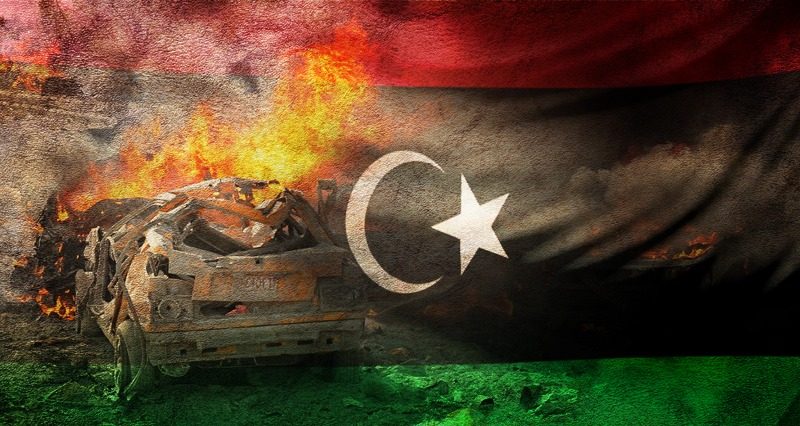The recent crisis in Libya has resulted in over 500 casualties, and a huge number of people being displaced, leaving the country essentially divided into two parts. The role of foreign countries is extremely critical to the current developments in Libya… countries whose selfish support of domestic groups has led to, and exacerbated the current conflict.
What is happening in Libya?
Libya’s domestic political landscape consists of two parallel groups: the “National Forces Alliance (NFC)” and the “Libyan Interim Government”.
The NFC located in Tripoli includes most of the political groups of the country. It is a combination of Libya’s liberal and Muslim Brotherhood forces that support the democratic Libyan government. Moreover, there is a Tobruk-based parliament functioning parallel to the Tripoli parliament which supports the interim government based in Bayda (Elbeida). It wants to establish a military regime similar to Abdel Fattah al-Sisi’s government and intends to appoint Khalifa Haftar as head of that government. Khalifa Haftar has a history of cooperation with the CIA. He came onto the scene in Libya via US efforts after the fall of Muammar Gaddafi’s government and was appointed as the head of the Libyan National Army in 2015 by the parliament.
The role of other countries in the Libyan crisis
To prevent the Muslim Brotherhood from gaining power in Libya and inhibiting the country’s Muslims from helping Gazans, thus tightening the siege on Palestine, the Egyptian government and the Israeli regime are supporting the interim government.
Following the Israeli and the Egyptian government’s lead, Saudi Arabia supports Khalifa Haftar in order to prevent the Muslim Brotherhood from regaining power. Riyadh has another reason which is gaining influence in North Africa. Due to the adoption of incorrect policies in recent years, Saudi Arabia has submitted the hegemony of the West Asia region -particularly in Syria, Iraq, Lebanon and Palestine- to Turkey and Iran. Ultimately, the United Arab Emirates (UAE) which does not want to be excluded from the region’s circle of decision-makers followed in the footsteps of Saudi Arabia as it did with Qatar, Yemen, and Syria.
The support of Riyadh, Cairo and Abu Dhabi was so significant for Haftar that in the past few months he was able to take control of not only Benghazi which is Libya’s second-largest city but also the El Sharara oil field, one of the biggest oilfields in the country’s southwest, expanding the number of lands under its control.
Today, a major part of Libya is under the control of the interim government and Khalifa Haftar. Their biggest problem, however, is their lack of popular legitimacy among Libyans.
At the end of March, Salman bin Abdulaziz met with Haftar to assure his support. This meeting was so important for the Saudis that instead of Mohammad Bin Salman who usually holds such meetings, Salman bin Abdulaziz himself met with Haftar. This is because the people of North Africa respect Salman bin Abdulaziz despite their bad feelings about Mohammad Bin Salman.
Another point of consideration is the withdrawal of US forces from west Tripoli. The United States Africa Command known as AFRICOM left the region a few days before Haftar’s forces attacked Tripoli. In other words, they left the door open for the arrival of Khalifa Haftar’s troops.
In addition to these countries, Russia also plays a role in the Libyan crisis. Until today, Russia insisted on the political settlement of the Libyan crisis without openly supporting any parties. Under conditions where influential countries are backing either side of the Libyan crisis, Moscow intelligently emphasized a political settlement by the Libyan people. Hence, it demanded that no other country intervene in the domestic affairs of Libya.
The role of ISIS in the crisis
Haftar’s troops claim they are liberating Tripoli from ISIS… however, is ISIS really fighting against Haftar in the opposing front?
Claiming the opposing force to be ISIS fighters is propaganda designed by the Muslim Brotherhood’s opponents and is done with three objectives in mind:
First – to remove ISIS affiliation from Khalifa Haftar forces
Second – to defame Libya’s Muslim Brotherhood forces
Third- to justify the military invasion of Tripoli
By designating the opposition as ISIS radicals, countries backing Haftar, particularly the UAE and Saudi Arabia, can openly help Haftar’s troops. The UAE has already provided military aid include drone weapons to Haftar which are being used in the battle for Tripoli.
Syria’s fate awaiting Libya
All evidence suggests that Haftar’s supporters- namely Saudi Arabia, Israel, the UAE, and Egypt – are repeating the same mistakes they made during the Syrian crisis. They are fully supporting forces that satisfy their interests and try to legitimize them by putting pressure on opposing groups through international decision-making conferences and organizations.
Three scenarios can be predicted for the future of Libya:
First: the victory of Haftar’s forces or an agreement about the complete control of the Libyan political landscape by the interim government and the full destruction of Muslim Brotherhood forces.
Second: the failure of Haftar’s forces.
Third: it is possible that Fayez al-Sarraj, the head of the Tripoli government, will form a coalition with Khalifa Haftar to maintain his own position.
If the third scenario takes place, the alliance between the secular Tripoli government and Tobruk military could end up a complete disadvantage for Libyan Muslims. In that case, very severe measures will be taken against Muslim groups.
If the first or second scenarios occur we could witness the continued intervention by foreign players, particularly Saudi Arabia, in Libya. Such interventions have already been tested in Syria and Yemen and will not result in anything but fracturing Libyan society, creating intensified ethnic conflicts and increasing insecurity in North Africa, while guaranteeing a new wave of war refugees to European countries.









Leave a Reply